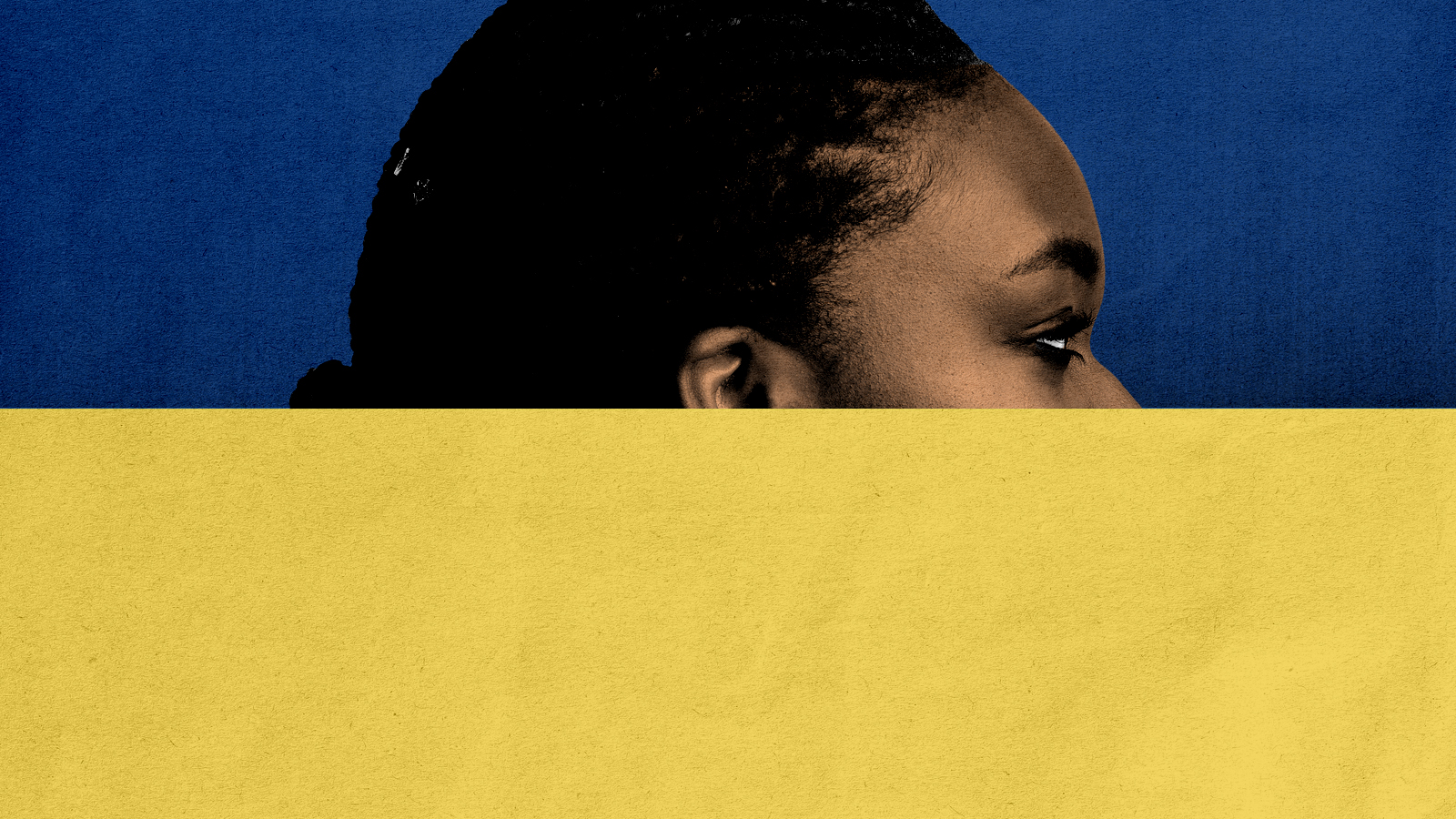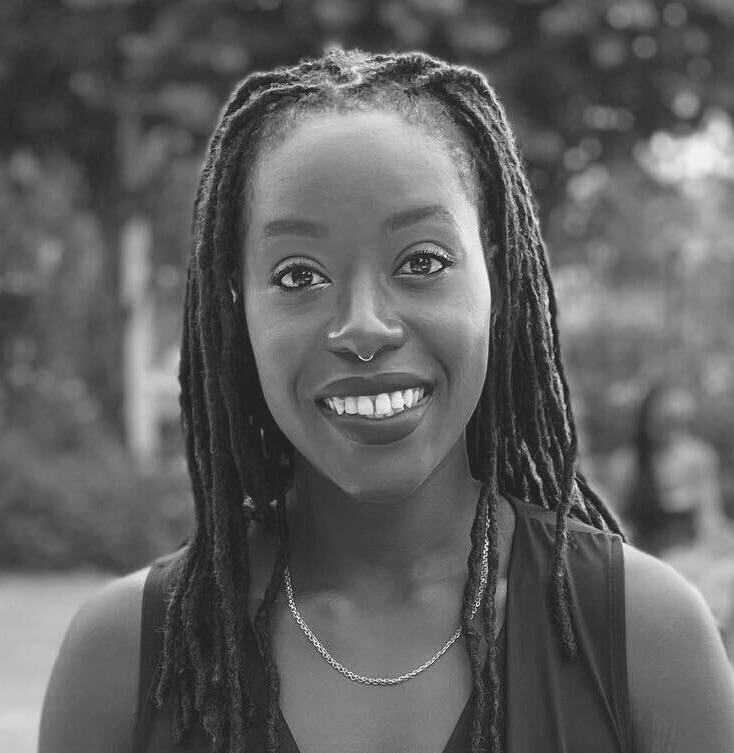The invasion of Ukraine and the moral conflict of sympathizing while Black
If you see Black people question their support for Ukraine, ask yourself what you'd feel in our place


A free daily email with the biggest news stories of the day – and the best features from TheWeek.com
You are now subscribed
Your newsletter sign-up was successful
Like other devastating turning points in history, many of us likely remember how and where we heard last week's harrowing news: After weeks of rising tensions, Russia had invaded Ukraine.
As we read the updates from the comfort of our relatively peaceful countries, we've experienced these same feelings of sorrow, fear, and sometimes guilt before. But there's another feeling that members of marginalized ethnic and racial groups often experience when Western and other industrialized countries face turmoil: cognitive dissonance.
After all, how does one reconcile supporting a nation in anguish with the knowledge that the same nation exacts harm against you?
The Week
Escape your echo chamber. Get the facts behind the news, plus analysis from multiple perspectives.

Sign up for The Week's Free Newsletters
From our morning news briefing to a weekly Good News Newsletter, get the best of The Week delivered directly to your inbox.
From our morning news briefing to a weekly Good News Newsletter, get the best of The Week delivered directly to your inbox.
Even in times of crisis, sometimes the oppressed can also be the oppressor. In the immediate, chaotic aftermath of Russia's invasion, the United Nations admitted that non-Europeans living in Ukraine experienced "different treatment" by military officers, border guards, and groups of civilians while trying to flee the country, according to Filippo Grandi, the organization's High Commissioner for Refugees. While Ukraine was certainly not a racial utopia before Russia's invasion, it's disheartening to know that even in the midst of devastation, anti-Black racism can remain strong.
Bernice King, daughter of Martin Luther King Jr., shared similar sentiments in a now-deleted post describing what she called "sickening" treatment of Africans trying to flee Ukraine. One CNN producer even claimed his own sister, who is from Sierra Leon, was subject to racism while on a daring journey to escape Ukraine and enter Poland.
Unfortunately, this is not an anomaly. When the world cries for peace, it often overlooks the treatment of Black and brown people in the process. "On the world stage, everyone sings Kumbaya. But this is the reality of what it means to be Black globally," tweeted the official account for GrapevineTV, a Black millennial media brand, along with a video that appeared to show African people being blocked from entering a train in Ukraine.
While people scramble out of the country, the Ukrainian military divided people into groups of white and non-white, one Afro-Ukranian resident alleged. Grace Kass told Time that "she and other African women were forced to wait outside as snow was falling, while white women and children were allowed to board before them." And one student from Guinea described being stopped at the border in an interview with France 24, claiming border guards told him and his group "that Blacks were not allowed."
A free daily email with the biggest news stories of the day – and the best features from TheWeek.com
While some reports have attempted to suggest this treatment wasn't about race, Ukraine's former deputy chief prosecutor said the quiet part out loud. "European people with blue eyes and blonde hair being killed," he bemoaned in an interview with the BBC.
The people of Ukraine need help, resources, prayers, and support; like all humans in crisis, they unequivocally deserve it. And that's true even if some of their compatriots, soldiers, and officials deny the same care to Black people.
But that denial makes solidarity truly difficult for many Black people and people of color. As Dr. Ayoade Alakija, the World Health Organization special envoy for the ACT-Accelerator, explained on Twitter, "Black Africans are being treated with racism and contempt in Ukraine [and] Poland. [The] West cannot ask African nations to stand in solidarity with them if they cannot display basic respect for us even in a time of war."
This cognitive dissonance is not only felt with Ukraine. In China, as COVID-19 ravaged the land, and the world was left aghast by reports of chaos and death, some responded to the plight with xenophobia and horrid treatment of Africans in Guangzhou (many of whom were left homeless). Likewise, the world has rightfully supported France after terror attacks there in recent years. But the country's treatment of minorities (particularly Muslims) can pose a conflict for some people of color who want to offer sympathy but also know French secularism consistently results in anti-Islamic policies like barring Muslim women from wearing hijab.
And, of course, in the United States, Black people have long grappled with the dissonance between fighting for the military of a country that consistently hurts and persecutes them. As the late Muhammad Ali is often attributed as saying (in what may be a fake quote but nevertheless gets at a real sentiment), "No Viet Cong ever called me n----r."
From the perspective of basic humanity, it goes without question that everyone deserves compassion in times of calamity and bloodshed.
But for people of color, particularly Black people, experiencing crises like this is never that morally simple. There's a real ethical quandary here. Blanket demands to stand up for other people — as is so often and so carelessly expected of the Black community, which in America is broadly held to Martin Luther King Jr.'s standards of nonviolence and forgiveness — can feel deeply unfair, particularly for those personally affected by these acts of racism.
Maybe King was right, and we should embrace other peoples in times of crisis even if they have a history of cruelty toward us. But if you see Black people question or even falter in their support for Ukraine, ask yourself what you'd feel in our place.
Nicole Phillip is a New York University alumna and multimedia journalist who currently works in the social media space. Her writing spreads across beats with a particular focus on matters of race and intersectional feminism. You can find her work in The Week, The New York Times, The 1619 Project digital publication, The Daily Beast, ABC News, and NBC Universal Local. She considers herself to be a skilled shapeshifter between journalistic mediums, but often finds herself drawn to writing.
-
 The ‘ravenous’ demand for Cornish minerals
The ‘ravenous’ demand for Cornish mineralsUnder the Radar Growing need for critical minerals to power tech has intensified ‘appetite’ for lithium, which could be a ‘huge boon’ for local economy
-
 Why are election experts taking Trump’s midterm threats seriously?
Why are election experts taking Trump’s midterm threats seriously?IN THE SPOTLIGHT As the president muses about polling place deployments and a centralized electoral system aimed at one-party control, lawmakers are taking this administration at its word
-
 ‘Restaurateurs have become millionaires’
‘Restaurateurs have become millionaires’Instant Opinion Opinion, comment and editorials of the day
-
 Witkoff and Kushner tackle Ukraine, Iran in Geneva
Witkoff and Kushner tackle Ukraine, Iran in GenevaSpeed Read Steve Witkoff and Jared Kushner held negotiations aimed at securing a nuclear deal with Iran and an end to Russia’s war in Ukraine
-
 ‘The forces he united still shape the Democratic Party’
‘The forces he united still shape the Democratic Party’Instant Opinion Opinion, comment and editorials of the day
-
 ‘The mark’s significance is psychological, if that’
‘The mark’s significance is psychological, if that’Instant Opinion Opinion, comment and editorials of the day
-
 The billionaires’ wealth tax: a catastrophe for California?
The billionaires’ wealth tax: a catastrophe for California?Talking Point Peter Thiel and Larry Page preparing to change state residency
-
 Trump considers giving Ukraine a security guarantee
Trump considers giving Ukraine a security guaranteeTalking Points Zelenskyy says it is a requirement for peace. Will Putin go along?
-
 Vance’s ‘next move will reveal whether the conservative movement can move past Trump’
Vance’s ‘next move will reveal whether the conservative movement can move past Trump’Instant Opinion Opinion, comment and editorials of the day
-
 What have Trump’s Mar-a-Lago summits achieved?
What have Trump’s Mar-a-Lago summits achieved?Today’s big question Zelenskyy and Netanyahu meet the president in his Palm Beach ‘Winter White House’
-
 Bari Weiss’ ‘60 Minutes’ scandal is about more than one report
Bari Weiss’ ‘60 Minutes’ scandal is about more than one reportIN THE SPOTLIGHT By blocking an approved segment on a controversial prison holding US deportees in El Salvador, the editor-in-chief of CBS News has become the main story
